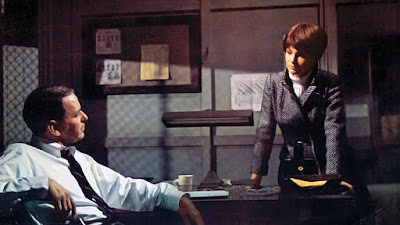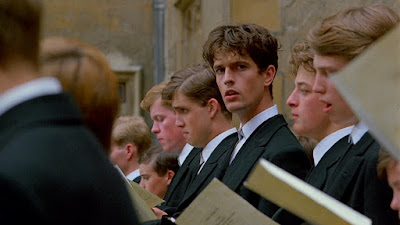What I’ve Caught Up With, July 2024 Part 2:
Film: Streets of Fire (1984)
I don’t know how I discovered Streets of Fire, but once I knew it existed, I knew I had to see it. The cast is loaded with a collection of people who don’t seem to belong together—Michael Paré, Diane Lane, Amy Madigan, Rick Moranis, Bill Paxton, Deborah Van Valkenburgh, and Willem Dafoe as the leader of a motorcycle gang, and so, so many more, plus it has a Ry Cooder soundtrack. This is a pseudo-rock opera about a singer (Lane) who is kidnapped by a motorcycle gang and rescued by her ex-boyfriend (Paré). Everyone dresses like they’re from the ‘50s, and the music comes from the ‘50s and ‘80s. It exists as its own fever dream of early MTV music, rockabilly, neon, sledgehammers, and Brylcream and an appearance in a nightclub by the goddam Blasters. Walter Hill is a mad genius, and this movie stands as testament to that. If I had seen this when I was 16, it would have ranked as one of my favorite movies, my ambivalence toward Diane Lane notwithstanding.
Film: The Little Hours (2017)
For a film that takes place mainly in a convent in the 14th century, The Little Hours has a surprising amount of sex and nudity. Nuns Alessandra (Alison Brie), Fernanda (Aubrey Plaza), and Ginevra (Kate Micucci) aren’t happy being nuns for various reasons. When a new handyman (Dave Franco) shows up, feelings are stirred up in them. Of course, the handyman is on the run from his former master for, naturally, having sex with his wife. Everything winds up out of control, and sex and Satanic rituals abound. The cast is a good one—in addition to those mentioned, John C. Reilly, Molly Shannon, Fred Armisen, Paul Reiser, and Nick Offerman make appearances. It’s chaotic, and honestly better in theory than it is in actuality.
Film: They Cloned Tyrone (2023)
When you create a movie that is about a country-wide conspiracy to keep people docile and to conduct experiments on predominantly Black populations in an effort to achieve racial harmony, and then that movie gets released on NetFlix on Barbenheimer weekend, you have to wonder at least a little. They Cloned Tyrone is a conspiracy-based science fiction comedy that blends as many genres as it can. It should be overwhelming, but the whole thing works. The cast is good top to bottom, but Jamie Foxx as a pimp named Slick Charles, John Boyega as a drug dealer, and Teyonah Parris as one of Slick Charles’s girls are the best part of something good. It feels longer than it needs to be, but it’s worth your time.
Film: The Detective (1968)
A rather surprising police movie, The Detective is the story of unassailable police detective Joe Leland (Frank Sinatra)who gets involved in a series of crimes that involve homosexuality, psychiatry, and suicide. He’s also dealing with a wife (Lee Remick) who can’t stop cheating on him and a police department that seems only too ready to look the other way depending on the crimes in question. The scandal goes deep, and the film ends up essentially being a post-1940s noir. The cast is a good one—Jack Klugman, Jacqueline Bisset, and Robert Duvall make appearances. Sinatra is always at his best when he’s not the ultra-cool boss of everything, and here, he’s a conflicted man just trying to do his job. It’s better than I expected it to be.
Film: Knight of Cups (2015)
In any movie where someone lives a life of decadence and then gives up that life, there’s a moment where that person wakes up after another all-night party and sees people sprawled across the house in various states of undress and inebriation. They look at themselves in the mirror and suddenly they’ve gotten old and things don’t satisfy them anymore. Knight of Cups feels like Terrence Malick writing a two-hour poem on that topic, with screenwriter Rick (Christian Bale) as the one waking up, using elements of the Major Arcana in a tarot deck as its muse. The cast is a good and deep one, the narrative is disjointed, and the meaning is what you make it. In other words, it’s a Terrence Malick film.
Film: 12 Angry Men (1997)
A remake of the 1957 classic, this is definitely a lesser version of the film, but it’s still a hell of a story. This version is directed by William Friedkin, and the cast has a number of real stars in it. Jack Lemmon takes the role of Juror 8, (the Henry Fonda role), with the ever-excitable and intense George C. Scott in the opposing role as Juror 3. Others include Courtney B. Vance, Ossie Davis, Armin Mueller-Stahl, Dorian Harewood, James Gandolfini, Tony Danza, Hume Cronyn, Mykelti Williamson, Edward James Olmos, and William Peterson. It’s a damn fine cast, and if the original didn’t exist, this would be likely considered a classic. If you can’t get the original version, this one will tide you over. It feels like a cheat because it’s not the one everyone knows, but seriously, this is a bulletproof screenplay.
Film: Another Country (1984)
Another Country is arguably ahead of its time for 1984 in the sense that it deals openly with the idea of homosexuality, at least in the context of British public schools. Essentially a movie about politics more than anything else, this looks at life in a British military boarding school between the world wars, which honestly seems like a ripe slice of hell. Guy Bennett (Rupert Everett) is gay and doesn’t really hide it despite the significant social penalties that come from it. His friend Judd (Colin Firth) is a communist, and so is an outcast in his own way. The film is a bit of a misdirection; it starts with an older Bennett talking about his defection to the Soviet Union and his time as a spy for them, and then devolves into boarding school politics. It’s good, but not really a necessary watch. Good cast, though—Cary Elwes is particularly believable as Bennett’s latest boyfriend.








The Detective was a good fit for Sinatra at this point in his career as his hipster persona was starting to fray and he became even more world weary. Plus, he is surrounded by an amazing cast, the film cost him his marriage to Mia Farrow however-she was supposed to play Jacqueline Bisset’s role but was tied up with Rosemary’s Baby and refused to back out infuriating Frank, so he served her with divorce papers on set. His character was also the basis for John McClane in Die Hard, the sequel to the novel that was the source of this film was where that film was derived from with obvious adjustments made. However, since it was tied to The Detective Sinatra had a contractual right to first refusal. Fortunately, he passed (he was in his 70’s at the time.)
ReplyDeleteStreets of Fire is just as you describe it, a sort of wild fever dream with quite the eclectic cast. Like you I was passed the age when I saw it to buy into it totally but like The Who’s Tommy it is a very individual picture.
The screenplay of 12 Angry Men is bulletproof though it still requires superior actors to make it work. This is an excellent version, but I’d agree that the original would be next to impossible to surpass.
I saw Another Country when it was first in theatres and I think some of the power of it has been blunted over the years by the fact that the immediacy of discovery of Colin Firth, Rupert Everett and Cary Elwes doesn’t exist now. They were all brand new (it was the first film for both Colin & Cary) and part of the impact of the picture was how strongly they all registered. I liked the movie, but it was the actors I remembered.
The Little Hours sounds like a bit of a wild ride. Haven’t seen the others.
I LOVE White Collar!! Such a fun show with great chemistry among the cast.
I passed Streets of Fire on to a friend of mine who is mildly obsessed with Willem Dafoe, and she had the same reaction I did. It's insane, but I kind of love it because of how insane it is.
DeleteThe Detective really is Sinatra at his best on camera--the world weariness doesn't feel like an act, but like the real thing, and that really comes through the screen. He's better when he's not the big man, but a real person.
I agree with you on Another Country. It's one of those movies memorable for the people who came from it--a sort of lightning in a bottle cast that doesn't ahppen that often.
I'm enjoying White Collar. It's my workout show--I reward myself with an episode if I go to the gym, so I'm watching at a pace of about 6 episodes/week. It's easy and fun, not too much to remember from show to show, and I love the cast. Willie Garson's passing is very sad; he is (for me) the best part of a fun group. Also lots of fun guest stars.
Malick's post-Tree of Life output in the early to mid-2010s aren't everyone's cup of tea but I love them. I love the sense of looseness in his films as well as the fact that both To the Wonder and Knight of Cups were semi-biographical as played into aspect of Malick's own life. He made those films plus Song to Song w/o a script but rather outlines and ideas where everyone gets to improvise. They were experimental and daring yet also engaging in its visual beauty. A Hidden Life is a return to a more narrative-based film and I think it's one of his best but also his most political.
ReplyDeleteThe Little Hours is a film I like though it is a somewhat-raunchy version of The Decameron (Pasolini's version is the most confrontational and daring) but it's still fun. Streets of Fire is one of these films that didn't get any lover when it first came out but I'm glad people are discovering it as it's a great film as Walter Hill continues to remain underrated.
William Friedkin's version of 12 Angry Men is not the Sidney Lumet film but it's still fucking awesome and with a cast like that. How could it not work?
I wouldn't mind another version of the story but with an ensemble of nothing but women helmed by a woman director.
The idea that The Little Hours is raunchier than a Pasolini film is rather surprising, and kind of makes me want to watch the Pasolini film.
DeleteI tend to need to be in the mood for Malick, but when I am, he tends to deliver. There's something dreamlike about so much of his work that I find attractive, but I need to prepare myself for it.
12 Angry Women? I'm in.